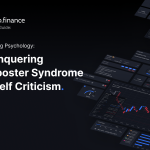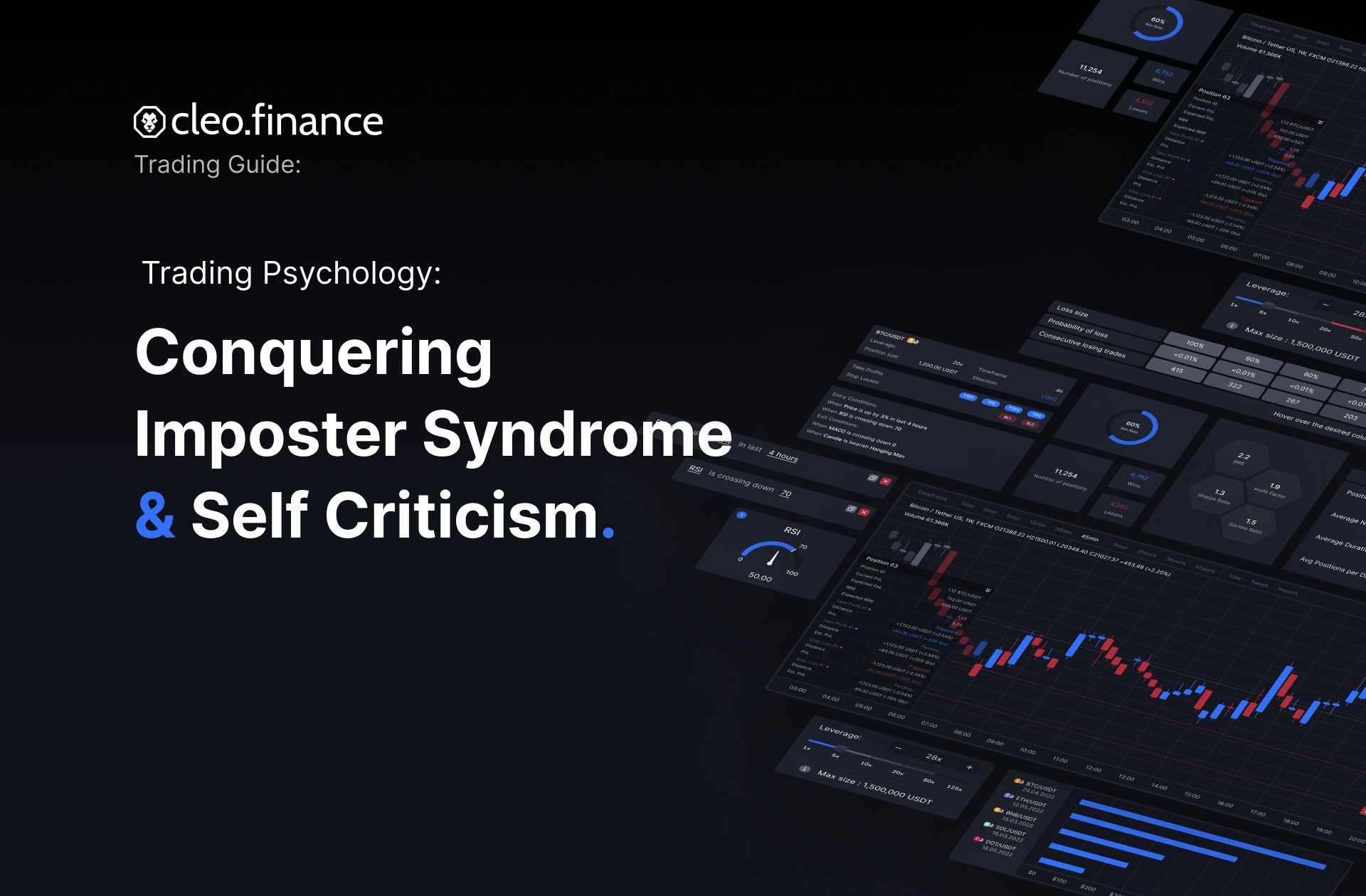Trading Psychology: Conquering Impostor Syndrome and Self-Criticism7 min read
Trading is a challenging and competitive field, and mental blocks can often hold us, traders back from reaching our full potential. Impostor syndrome and being overly critical of oneself are two of the most common mental demons faced by traders. Novices are even actively looking for mentors to help them deal with their internal trading monologue.
These internal obstacles can cause self-doubt, fear, and negative self-talk, which can impact a trader’s decision-making abilities and limit their success. However, with the right tools and techniques, these mental blocks can be overcome and transformed into strengths.
In this blog post, we will dive into the trading psychology and explore the impact of impostor syndrome and self-criticism on a trader’s mindset. We will provide practical strategies and tips to help traders identify and overcome these mental demons, allowing them to trade with confidence and reach their full potential. Whether you’re a seasoned trader or just starting out, these techniques can help you overcome your mental blocks and achieve success in the world of trading.
Table of Contents
Impostor syndrome
Imposter syndrome is a psychological phenomenon where a person doubts their accomplishments and feels like a fraud despite external evidence of their competence and success. People with imposter syndrome often have a persistent fear of being exposed as a fraud, despite being well-respected in their field or achieving success in their personal and professional lives. It can affect people in any area of life, including us, retail traders.
Imposter syndrome can manifest as doubting your ability to consistently make profitable trades, or when you compare yourself to other traders who you perceive as more successful. You may feel like you are not a “real” trader, and that your wins are just you getting lucky. This can lead to feelings of anxiety, self-doubt, and negative self-talk, which can in turn affect your trading decisions and performance.
Additionally, you may struggle with imposter syndrome when you experience a string of losses, which tend to lead to a sense of failure and self-blame. You can feel like you are simply not good enough or don’t have the skills necessary to succeed in trading, even if you have a trading strategy with positive expectancy and have made successful trades in the past.
Personally, I find myself grappling with impostor syndrome all too often. Whenever I hit a losing streak, I start questioning my abilities – as if after all these years in the field, I shouldn’t experience any losses! And even when I’m on a winning streak, I can’t help but feel like it’s just luck, because my trading strategy is “too simple to work”. It’s a constant battle with my own mind, and it can be exhausting.
How to overcome imposter syndrome
So, what can you do to overcome the imposter syndrome? Well, start by focusing on building your trading skills through education and practice. In fact the process of learning can really shake your confidence.
I find solace in my trading statistics. Whenever I am mentally down, I take a step back, have a look at my trading performance as a whole, and see the bigger picture. I recognize that I’ve done the work, have fully backtested strategy, done hundreds upon hundreds of trades using it, and that I have faced this before and came out on top.
Another helpful thing can be periodically unplugging. Go outside, touch some grass, spend time with friends. Markets will be here when you get back. Developing positive self-talk, acknowledging your accomplishments, and celebrating small wins can also be helpful in overcoming imposter syndrome. I talked more about ways to strengthen your trading psychology in article about trading fears, so go check that out if you are interested.
And if things get really tough, seek support from a trading community, mentor, or therapist who can help you navigate your emotions and mindset around trading. Remember that asking for help is a sign of strength, not weakness.
Being too critical post-mortem
Being overly critical of your decision-making after the price has already moved, and you finally have all the information you didn’t have before, is a trap I personally fall into all too often. It’s easy to get angry at my own decisions and question my logic when I see what happened afterwards. But working with partial information is hard. Very hard. It’s not uncommon to second-guess yourself and feel uncertain when you don’t have all the facts.
One thing that has helped me is to focus on the process, rather than just the outcome. Instead of beating myself up over a trade that didn’t go my way, I try to analyze my decision-making process and learn from it. I also remind myself that every trade has risks and uncertainties, and it’s impossible to predict the market with complete accuracy (again, unless you are an FOMC member).
How to stop being too critical of yourself
It’s important to remember that even the most experienced traders make mistakes, and losses are a normal part of the trading process. Instead of dwelling on past mistakes, try to learn from them and improve your decision-making in the future. By doing so, you can become a more confident and successful trader.
There’s even those that do trading meditation to focus!
What helped me the most is recording my thoughts about each trade and reasoning on a short video, explaining the trade setup to someone (perhaps my imaginary friend) who wants money from me (well, maybe an imaginary debt collector). The goal of this exercise is to provide enough evidence of a high probability risk-defined trade setup, that it will “persuade” this imaginary friend, that the trade is a good idea. And once the trade is done and I feel the criticizing desire creeping up, I watch it and record the post-mortem video – where I state what I thought is going to happen and what then actually happened.
This has worked wonders for me, it helps me avoid self-doubt and improve my trading psychology, and in general be kinder to myself. But this approach could (should) be systemized. So here are some actions you can take to improve and refine your approach:
- Structure your recording process: Whether it is a video journal or written one, try creating a template or form that you fill out for each trade. Include information such as the trade setup, entry and exit points, risk management strategy, and the reasons why you entered the trade.
- Be objective in your post-mortem analysis: Instead of focusing solely on what went wrong, also look for things you did well and areas where you can improve. Trade is closed, emotions associated with it should be out the door as well.
- Keep detailed trading journal: Keep track of all your trades, identify patterns in your decision-making, and track your progress over time.
- Consider getting feedback from other traders: It can be helpful to get feedback from other traders on your trades and thought processes. This can help you identify blind spots or biases you may have and improve your decision-making in the future. There are plenty of discord groups for that.
The ultimate goal is to be more organized, and make it easier to analyze your trades in the future. Remember that every trade is an opportunity to learn and grow as a trader!
Conclusion
The impostor syndrome and being overly critical of oneself can be significant mental barriers for traders. It is essential to recognize and address these challenges, as they can undermine confidence and lead to suboptimal decision-making. By focusing on building trading skills through education and practice, unplugging periodically, developing positive self-talk, and seeking support from a trading community or therapist, traders can overcome these mental barriers and improve their performance.
In addition, using structured and objective approaches, such as recording your thoughts and analysis of each trade, can help you cope with being overly critical of yourself and improve your decision-making over time. Remember that every trade is an opportunity to learn and grow, and every challenge is an opportunity to develop resilience and strength. By approaching trading with a growth mindset, you can overcome self-doubt and become a successful trader.
We’ve developed trading platform cleo.finance to help you do that. Give it a try and let us know how we can improve your trading experience even more. Happy trading and I’ll see you on the trading floor!





